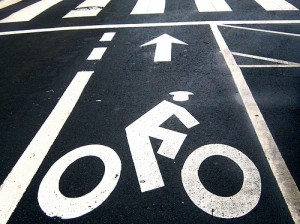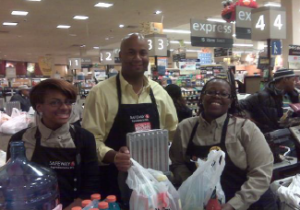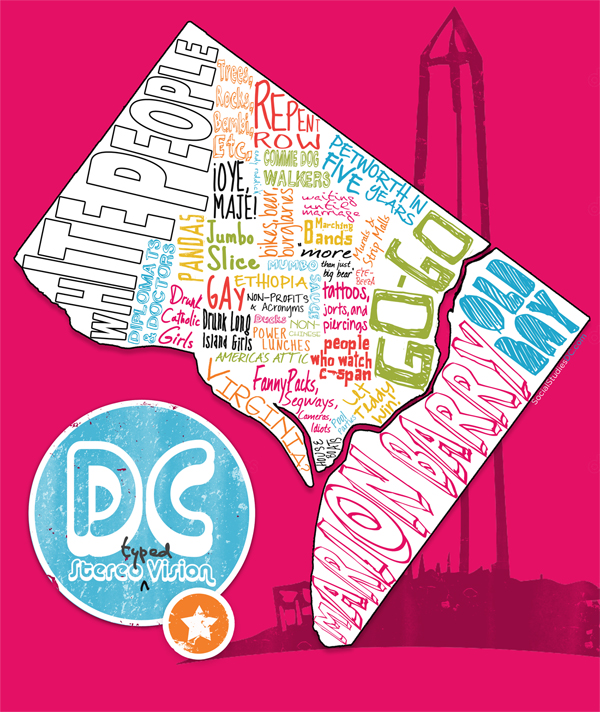The public dedication of the Martin Luther King, Jr. Memorial will take place Aug. 28, but it will be open for public viewing Tuesday for “D.C. Residents’ Day.”
Tasty Morning Bytes – $8 Eggs, Black Scientist Woes and A Modern-Day Harriet Tubman
Good morning, DCentric readers! Welcome back from the weekend:
$8 Eggs and the Cost of Food “There are many, many people out there, of varying socioeconomic levels, who are worried about what goes into their food. A one size fits all prescription (“eat less meat” or “go vegan“) removes any incentive to bring more people into the movement (the food movement big tent: we have catering, and it is tasty!)- you either care about it and don’t complain, or you don’t care enough, and can go back to your wasteland of McDonalds and Chinese takeout.” (PostBourgie)
Black Scientists Less Likely to Win Federal Research Grants, Study Reports “Even when the researchers made statistical adjustments to ensure they were comparing apples to apples — that is, scientists at similar institutions with similar academic track records — the disparity persisted. A black scientist was one-third less likely than a white counterpart to get a research project financed, the study found.” (New York Times)
Allen West: ‘I’m Here As The Modern-Day Harriet Tubman’ To Lead Blacks Out Of The Dem ‘Plantation’ (VIDEO) “Rep. Allen West (R-FL) said that the Democratic Party has kept African-Americans on a “21st-century plantation,” with liberal black politicians being like the “overseers” who would rule over the slaves — and likened himself to Harriet Tubman, the most famous member of the Underground Railroad movement, who helped over 70 slaves escape to freedom and inspired many others by her example.” (Talking Points Memo)
The undoing of a village’s character “Without a strong sense of community and direction, youths and young adults become wolflike members of a pack and go on the prowl. It’s on the front end, instilling a sense of family and community, not on the back end, after flash mob perpetrators are locked up, where our messages are falling short.” (Washington Times)
Continue reading
“Nearly 200,000 D.C households survive without any cars”
Around 10 percent of local residents get by without cars–all the more reason to maintain and protect public transportation. Over 90% of those “zero-vehicle households” are near a bus or metro stop:
Five Takeaways ‘On the symbolism—and politics—of bicycling in D.C.’
Is the anger in D.C. toward bicyclists misdirected? This week’s Washington City Paper cover story explores the issue. Here are five points in the article that stand out:
Bike lanes are inaccurately characterized as a “welcome mat ” for rich, white gentrifiers. Yet some of the locals in Ward 3,which includes Tenleytown, dislike bike lanes as much as people in Ward 7, Fairlawn . So people of all races and classes can find common ground in their discomfort with bike lanes: “If anti-bike-lane sentiment were really about race or class, it’s unlikely that a white guy from Ward 3 and a black guy from Ward 7 would sound nearly exactly the same when they talk about the topic.” Reporter Alex Baca suggests the feeling comes from old-timers who see the bike lanes as a symbol of change.
Bikes are seen as oppositional to cars. Cars symbolize powerful things like freedom and the “American” way. Bicyclists are then tarred with an extremely negative brush: “Anyone with access to a Bruce Springsteen album knows there are deep veins of American culture where four wheels signify freedom, adulthood, and maybe even America itself. Those who shun automobiles, by extension, shun all of those things. Like grown-ups playing kickball or attending Twitter-fed snowball fights, such a rejection of traditional adulthood seems like the realm of the privileged.”
It’s the media’s fault. Quick, what’s an easy way to encapsulate complicated social dynamics, change, race, class and everything else that might cause tension in a city? Bike lanes! “David Alpert, editor of the blog Greater Greater Washington, suggests the brouhaha was propped up by media outlets looking for a quick way to frame last year’s mayor’s race. ‘I think to some extent it became an easy shorthand for people writing about race relations and about divisions in D.C.,’ he says.”
D.C. is not special. People love to compare the District to New York City, which isn’t rushing to embrace bike lanes, either. “Look at New York, where transportation commissioner Janette Sadik-Khan has been vilified in Park Slope (where brownstones sell for nearly $2 million) and Staten Island (a stronghold of the white ethnic middle class) alike for installing lanes.”
A key reason why some residents are against bike lanes has nothing to do with race or class: They simply weren’t consulted first. A lack of outreach or communication from city government resulted in resentment: “Bike lanes in D.C. seem to come with an extra emotional charge, a legacy of the way they were installed—rapidly, and without much notice to or input from the people nearby—under Fenty and his transportation czar, Gabe Klein.”
Tasty Morning Bytes – Black Marriage, Redemption of Michael Vick and More Flash Mobs
Good morning, DCentric readers! Here are your Friday links:
D.C., MontCo to join federal illegal immigrant crackdown “In 2010, the D.C. jail held 185 inmates on warrants from ICE…Only 10 were released to ICE, and another 78 to the U.S. Marshals Service. More than 30 were put back on the streets. A DOC spokeswoman did not respond to requests for comment.” (Washington Examiner )
School Districts Rediscover Value of From-Scratch Meals “’The biggest myth is that it costs more money,’ said Kate Adamick, a food consultant based in New York and co-founder of Cook for America. She said federal reimbursement rules could actually give poorer school systems some advantages in shifting back to scratch, especially for meat, which many districts buy with deep discounts. Cooking the meat themselves, rather than paying a processor, can drastically reduce total costs, she said.” (The New York Times)
Black Marriage: Good News by the Numbers “In Washington, D.C., 36 percent of those with only a high school diploma, 47 percent of those with a college degree, 59 percent of those with a master’s or professional degree and 62 percent of those with doctoral degrees are married. There’s a similar pattern in Atlanta. So much for having to choose between a diploma (or four) and a husband.” (The Root)
The Impossible, Inevitable Redemption of Michael Vick “it is still estimated that tens of thousands engage in dogfighting—which is notoriously more prevalent in urban areas, where it has been part of African-American culture for decades. Vick, well versed in his talking points on this matter, hesitates to make this a race issue. And yet: ‘Yeah, you got the family dog and the white picket fence, and you just think that’s all there is. Some of us had to grow up in poverty-stricken urban neighborhoods, and we just had to adapt to our environment. I know that it’s wrong. But people act like it’s some crazy thing they never heard of. They don’t know.” (GQ)
Flash Mob Robberies Continue “In the latest incident, 10 women stormed the Shop Express convenience store along Benning Road in northeast Washington at about 3:15 a.m. Thursday. They loaded up on food, drinks and snacks at different parts of the store. Some of the women were carrying bags to hold some of the items. Then they all rushed out of the store at the same time without paying. ” (NBC Washington)
“District’s Hispanics leaving Mount Pleasant for Georgia Ave”
According to a George Mason University analysis, the cost of a condominium in Mount Pleasant nearly tripled between 2000 and 2010. A lack of affordable housing is responsible for the residential shift to Georgia Avenue. But while Hispanics are moving to and living elsewhere, they are still shopping in Mount Pleasant, where small businesses cater to them.
D.C. Home Ownership By Race
Whites make up the largest percentage of D.C.’s home owners, and they are followed closely by African Americans. That’s according to new U.S. Census Bureau data detailing the race of people who are on deeds and leases of the District’s 266,707 occupied housing units.
Despite the seeming parity between whites and blacks in home ownership, there are far more black than white people in the District — 70,702 more in 2010 — and a disproportionately low number of blacks own homes when compared to whites. Whites over-represent home owners.
As for renters, African Americans are on most of the leases in the District, followed by whites, Latinos and Asians. And all of this data excludes D.C.’s 17,316 multiracial residents, which constitute 2.9 percent of the city’s population.
| Owner-occupied units |
Renter-occupied units |
Percentage of total population | |
| Black: | 48,887 | 77,012 | 50.7% |
| White: | 51,838 | 55,144 | 38.5% |
| Latino: | 5,676 | 12,342 | 9.1% |
| Asian: | 3,311 | 6,246 | 3.5% |
Source: U.S. Census Bureau
Why is home ownership so important? It’s long been viewed as one of the keystones in building wealth and climbing out of poverty. And although the black middle class was particularly hit hard when the housing bubble burst because so much of their wealth was tied up in home equity, District home owners have fared better than elsewhere. D.C. is the only city where housing prices increased over the past year. The District’s home ownership rate has risen by 45 percent over the past decade, but it appears the rate isn’t increasing fast enough for everyone.
Tasty Morning Bytes – Georgetown Identity Crisis, Delivering to Food Deserts and TSA Hair Profiling
Good morning, DCentric readers! Some links, for your morning coffee break:
As Furin’s bakery closes after 27 years, Georgetown retail faces identity crisis “At the turn of the 20th century, Georgetown was what Billy Martin, the third-generation owner of Martin’s Tavern on Wisconsin at N Street and a Georgetown history buff, described as a ‘very blue-collar neighborhood’…What many people don’t know is in the early 1900s, it was primarily African American. It had a seaport and a coal facility,’ said Martin, as well as a lumber yard, a cement plant, a flour mill, a textile mill, a paper factory, a power plant and a garbage incinerator.” (The Washington Post)
Brand Degradation Over at The Atlantic, Ta-Nehisi Coates takes on popular mall retailer Abercrombie and Fitch’s decision to pay a Jersey Shore star NOT to wear the brand’s clothing, because it is damaging their image: “It’s an interesting class conflict. These guys create an aspirational brand, and people who are “aspiring”–in all kinds of ways–flock to it.” (The Atlantic)
DCCK to deliver produce to D.C. food deserts “The Healthy Corners pilot program will target bodegas and retailers in those D.C. neighborhoods that have been designated food deserts by the U.S. Department of Agriculture.” Bodegas will get regrigeration units and either low- or no-cost fruits and veggies. Some of the produce will be local, whenever possible (Apples, yes. Bananas? No.) There will even be recipe cards with cooking tips! (The Washington Post)
Continue reading
Councilmember Michael A. Brown to Give Away 600 Backpacks in Southeast, Tonight
D.C. Councilmember Michael A. Brown will give away 600 backpacks filled with school supplies tonight, between 6-8 p.m. while supplies last. School starts Monday.
The backpacks are strictly for District residents and will be distributed during the “Back to School Community Cookout.” The event, at 2845 Alabama Ave SE, will also feature food and entertainment.
Councilmember Brown is quoted in a press release as saying, “I look forward to meeting with students and parents as we prepare for the upcoming school year and am grateful I can assist in a small way with needed supplies. More importantly, I hope to encourage our youth to understand that anything is possible with a strong education.”
D.C. Mapped By Stereotypes
Do you live amongst go-go, jumbo slice, commie dog walkers or in Ethiopia? Check your location against the DC Stereotype Map, produced by SocialStudiesDC, which attached stereotypes to neighborhoods in a tongue-in-cheek graphic:
Do you take issue with any of the categorizations? Let us know in the comments.








